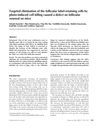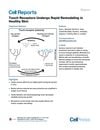16 citations,
June 2018 in “JAAD case reports” A JAK inhibitor improved both severe hair loss and chronic skin disease in one patient.
 4 citations,
November 2023 in “Frontiers in immunology”
4 citations,
November 2023 in “Frontiers in immunology” New treatments targeting T-cell pathways are needed for better alopecia areata management.

Tofacitinib may effectively treat hair loss and improve symptoms in autoimmune conditions like alopecia areata and Sjögren's syndrome, but long-term treatment might be necessary.
 May 2023 in “Journal of Clinical Medicine”
May 2023 in “Journal of Clinical Medicine” New understanding and treatments for hair loss are improving, but more research is needed.
March 2024 in “Current issues in molecular biology” Personalized medicine in dermatology uses molecular biomarkers to improve diagnosis and treatment but needs further advancements for practical use.
 August 2023 in “Dermatology and Therapy”
August 2023 in “Dermatology and Therapy” Experts recommend personalized treatment plans for best outcomes in managing Alopecia Areata.
 October 2024 in “Journal of the European Academy of Dermatology and Venereology”
October 2024 in “Journal of the European Academy of Dermatology and Venereology” Ritlecitinib and baricitinib are similarly effective for hair regrowth in severe alopecia areata.
 275 citations,
March 1999 in “Journal of The American Academy of Dermatology”
275 citations,
March 1999 in “Journal of The American Academy of Dermatology” Chemotherapy can cause various skin reactions, with hair loss being the most common, and proper diagnosis and treatment of these reactions are important.
 June 2024 in “Dermatology and Therapy”
June 2024 in “Dermatology and Therapy” Baricitinib improves quality of life and reduces anxiety and depression in severe alopecia areata patients with hair regrowth.
 63 citations,
May 2011 in “Clinical cancer research”
63 citations,
May 2011 in “Clinical cancer research” The topical inhibitor CUR61414 was not effective in treating basal cell carcinoma in human trials.
4 citations,
January 2011 in “International Journal of Clinical Medicine” Patients with metastatic breast cancer treated with epirubicin and docetaxel had a good response and maintained their quality of life.
 32 citations,
October 2004 in “Pharmacotherapy”
32 citations,
October 2004 in “Pharmacotherapy” Peginterferon alfa-2b and ribavirin therapy for hepatitis C can cause serious side effects, some different from those reported in clinical trials.
 81 citations,
July 2011 in “Lasers in Medical Science”
81 citations,
July 2011 in “Lasers in Medical Science” The Lexington LaserComb helped regrow hair in mice with a condition similar to human hair loss.
 26 citations,
May 2015 in “Lasers in Surgery and Medicine”
26 citations,
May 2015 in “Lasers in Surgery and Medicine” Laser treatment helped regrow hair in mice by activating a key growth pathway.
 August 2024 in “PLoS ONE”
August 2024 in “PLoS ONE” Combining PRP with Minoxidil improves hair density and thickness more than Minoxidil alone.
 44 citations,
September 2015 in “Annals of Oncology”
44 citations,
September 2015 in “Annals of Oncology” Targeted cancer therapies have a significant but lower risk of causing hair loss compared to chemotherapy.
 April 2024 in “Canadian Journal of Ophthalmology”
April 2024 in “Canadian Journal of Ophthalmology” A woman with advanced eye cancer went into complete remission using a combination of immunotherapy and topical treatments.
 46 citations,
February 2012 in “Oncology Reports”
46 citations,
February 2012 in “Oncology Reports” Sorafenib helps some advanced cancers alone or with other treatments, but not all, and research continues to improve its use.
 March 2024 in “Journal of functional foods”
March 2024 in “Journal of functional foods” Collagen peptides from marine and bovine sources may help prevent hair loss by affecting hair follicle stem cells differently.
 211 citations,
May 2013 in “Journal of Nutrition Health & Aging”
211 citations,
May 2013 in “Journal of Nutrition Health & Aging” MK-0773 safely increased muscle mass but did not improve muscle strength or function in elderly women with sarcopenia.
 December 2023 in “Frontiers in pharmacology”
December 2023 in “Frontiers in pharmacology” Progesterone initially worsens but later reduces neuropathic pain in mice, through different mechanisms.
 21 citations,
January 2018 in “The Korean Journal of Physiology and Pharmacology”
21 citations,
January 2018 in “The Korean Journal of Physiology and Pharmacology” Modified stem cells from umbilical cord blood can make hair grow faster.
 23 citations,
January 2018 in “Elsevier eBooks”
23 citations,
January 2018 in “Elsevier eBooks” Nanoemulsions improve stability and delivery of active ingredients in cosmetics for skin and hair care.
 8 citations,
September 2002 in “Genes to Cells”
8 citations,
September 2002 in “Genes to Cells” Killing specific cells in hair follicles can lead to hair growth problems in mice.
 129 citations,
October 2000 in “British Journal of Dermatology”
129 citations,
October 2000 in “British Journal of Dermatology” Finasteride helps increase hair growth in men with hair loss.
 16 citations,
October 2018 in “Biochemical and Biophysical Research Communications”
16 citations,
October 2018 in “Biochemical and Biophysical Research Communications” Sildenafil, often used for erectile dysfunction, may help hair growth.
 42 citations,
February 2014 in “Stem Cells and Development”
42 citations,
February 2014 in “Stem Cells and Development” Vitamin C helps adipose-derived stem cells grow and may support hair growth.
 31 citations,
November 2016 in “Cell Reports”
31 citations,
November 2016 in “Cell Reports” Touch sensitivity in mouse skin decreases during hair growth due to changes in touch receptors.
 16 citations,
October 2023 in “Molecular cancer”
16 citations,
October 2023 in “Molecular cancer” New treatments like nanotechnology show promise in improving skin cancer therapy.
 February 2024 in “ACS Omega”
February 2024 in “ACS Omega” The Shen Bai Hair Growing Decoction may help treat hair loss by promoting hair growth and reducing inflammation.


























